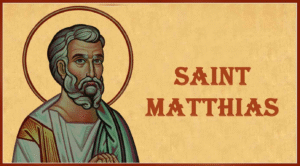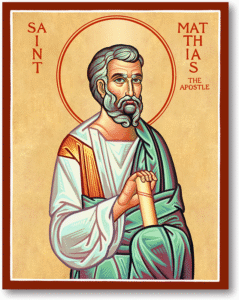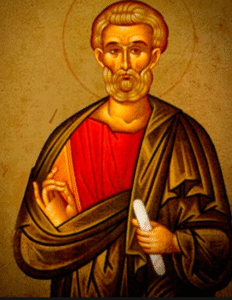Apostle St Matthias – Aug 9

The Greek Matthias or Maththias, is a name derived from Mattathias, (Heb. Mattithiah, signifying “gift of Yahweh). St. Matthias was not one of the original Apostles but was chosen by the other Apostles when Judas left their rank. One apostle had defected, the deserted office of the betrayer needed to be occupied. According to Acts 1:15-26, during the days after the Ascension, Peter stood up in the midst of the brothers (about 120 of Jesus’ followers), and said, to fulfill the scriptural recommendation: “May another take his office… Therefore, it is necessary that one of the men who accompanied us the whole time the Lord Jesus came and went among us, beginning from the baptism of John until the day on which he was taken up from us, become with us a witness to His Resurrection” (Acts 1:21-22).
“Therefore, it is necessary that one of the men who accompanied us the whole time the Lord Jesus came and went among us, beginning from the baptism of John until the day on which He was taken up from us, become with us a witness to His Resurrection” (Act 1:21-22). Peter declared, because all of Christianity depends on the Resurrection of the Lord. An apostle had to preach not only the glory, but also the truth of the Risen Savior. Two were named of equal merit and qualification, Joseph called Barsabbas-the son of Sabbas and Matthias. Of the two candidates between whom the great decision was to be made, Matthias was noticeably placed second. Barsabbas, with the honorable Roman surname Justus-from the Latin, “the righteous, or upright, one was placed in the first place.”

The Eleven did not dare to select the successor of Judas, aided only by their own judgment and responsibility, and their own sympathies. “You have not chosen Me, but I have chosen you.” This fundamental principle of the Lord had to remain the standard for the choosing of a substitute apostle. The office in the apostolate was of such great responsibility and dignity that no one except God could, or should, have conferred it. What is so striking about the selection of Matthias to us today is the manner in which the apostles sought to discover the divine command; they cast lots. The apostles, therefore, were adhering to the practices of the Old Testament when they sought to learn by lot whom the Lord willed to be the apostle to replace Judas. The casting of lots happened in such a way that the names of the two candidates were written on small pieces of tablet and shaken in an urn. He whose name fell out of the urn first was the one chosen. This reveals the small difference between Matthias and the other apostles. The Eleven were called directly by Christ during our Lord’s public life. Matthias was also chosen by Christ, but not directly, as were the others.
The Apostle Matthias represents the brightening of the darkness, the bridging of an abyss, the beginning of a new epoch. He was not one of the original Twelve, but He was there to take his place, after Judas fell from the ranks of the apostles. He became the first apostle chosen after the death of the crucified Christ. The apostle Matthias is a source of joy to Christian hearts. The apostle and the disciples had the same mission, although their office was not the same. Matthias was one of the seventy disciples of Jesus and had been with Him from His baptism by John to the Ascension. Now he was one of the Twelve, an apostle, to continue and perpetuate His work on earth until the end of time, for all mankind. He belonged to the Twelve, who were preceded by the twelve tribes of Israel, the foundation stones of Jerusalem. He was near the Messiah from the very beginning. Perhaps he, like many of the other apostles, had already belonged to the group around John the Baptist. Certainly, he left his home and occupation when Jesus entered his life and followed the Lord through the streets. Apostle Matthias was born at Bethlehem, a descendent of the Tribe of Judah. From his early childhood he studied the Law of God in accord with the Books of Scripture under the guidance of Saint Simeon the God-Receiver. When the Lord Jesus Christ revealed Himself to the world, Saint Matthias believed in Him as the Messiah, followed constantly after Him and was numbered amongst the Seventy Disciples, whom the Lord “did send by twos before His face” (Lk. 10: 1). It is believed that Matthias placed his faith in Jesus Christ above everything else and was present with the other apostles at the Pentecost. He embraced all the teachings of Jesus and sacrificed his life for the service of the Lord, even after being persecuted by many.

All further information concerning the life and death of Matthias is vague and contradictory. He first preached the Gospel in Judea, then in Ethiopia (that is to say, Colchis) and was crucified. He accompanied Apostle Andrew during a three-year journey and was with him at Edessa and Sebaste. According to a tradition, he preached at Pontine Ethiopia (presently known as Western Georgia) and Macedonia. He was constantly persecuted by the people there but kept preaching the Gospel to them. Uncertain traditions report that the disciple of Jesus whom the faithful Eleven Apostles chose to replace Judas; preached the Gospel in Palestine, Cappadocia or Ethiopia. According to another tradition, Matthias preached the Gospel to barbarians and cannibals in the interior of Ethiopia, at the harbour of the sea of Hyssus, at the mouth of the river Phasis. In one version of the story, the Pontine Ethiopians were considered to be pagans and barbarians, and they forced the saint to drink poison. But he remained unharmed because he had the Lord’s protection, and he even healed other prisoners who were blinded by the poison. Saint Matthias left the prison, and this enraged the pagans who kept searching for him in vain. They intended to kill the saint, and according to the story, the earth opened-up and engulfed them.
After this, he returned to Judaea and continued enlightening his countrymen about Christ’s teachings. He also told them how he was able to perform miracles in the name of Lord Jesus and motivated many to have faith in Christ. This enraged the Jewish High Priest Ananias, who hated Christ. He had already ordered the execution of Apostle James in the past and decided to arrest Matthias. The saint was brought for judgment before the Sanhedrin at Jerusalem. During the hearing, High Priest Ananias slandered the Lord with a blasphemous speech. But Apostle Matthias, using the prophecies of the Old Testament, explained that Jesus Christ is “the True God, the promised Messiah, the Son of God, Consubstantial and Coeternal with God the Father.”
Still another tradition maintains he preached in Judea where he was persecuted by both Jews and Gentiles, and was stoned at Jerusalem by the Jews, and then beheaded, a victim of their pursuits, in the year AD 63. Saint Helena, mother of Constantine, took his body to Rome, some 250 years later. A Church there bears his name. It is said that St. Helena brought the relics of St. Matthias to Rome. Helena, requested that Agricus, who died in the year 332, be made bishop of Trier. To him she gave the seamless robe of Christ (such a garment is still displayed on occasion in Trier as recently as 1959), a nail from the true cross and the relics of the apostle Matthias and that portion was kept at Trier.
He also worked many miracles in the name of Lord Jesus, which converted many to the Christian faith. He is a patron of carpenters, tailors, and those who are affected by smallpox. The date of the feast day of the apostle Matthias is commemorated on different dates by different Churches – May 14, & February 24 and 9 August. We have one Church, in the name of St Matthias at Kunnamkulam.

0 Comments